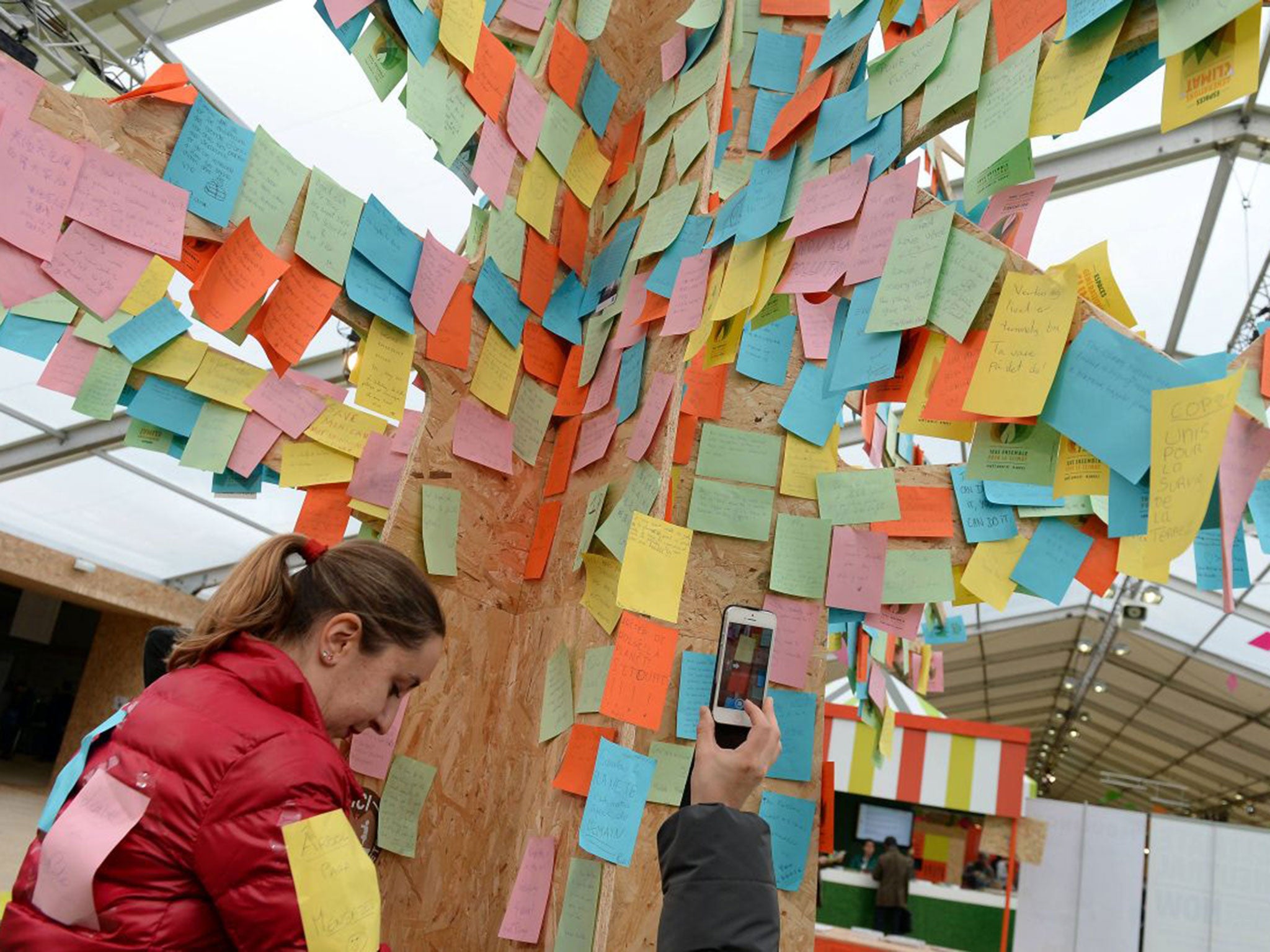COP21: Fatigue takes its toll as officials race to secure climate change deal
Talks are expected to spill into the weekend as tensions about remaining sticking points threaten to become rows

Ministers and negotiators are enduring a second consecutive round of all-night talks in Paris as they race to secure a historic deal to tackle climate change.
As the two-week United Nations Climate Change summit enters its last official day on Friday, the signs of fatigue among the 40,000 participants are plain to see – and not just in the lengthening queues at the coffee stands.
It is now expected that the talks could spill over into the weekend as tensions about the remaining sticking points threaten to turn into rows. The yawns of bleary-eyed politicians and their advisers are becoming more frequent, as they become less articulate and prone to losing their train of thought.
And mistakes are beginning to be made as exhaustion takes its toll.
Claudio Salerno, the Venezuelan climate envoy, acknowledged that she accidentally forgot to include a section on “intergenerational equity” – looking after our children and grandchildren – in the latest draft of the agreement.
“It was a human error. It was due to fatigue,” she told her fellow negotiators.
The summit organisers have set up relaxation rooms with comfortable couches around the 60-hectare conference centre in the Le Bourget suburb near Charles de Gaulle Airport. Some negotiators have even been assigned spots for sleeping.
But with adrenaline levels running high as the deadline for an agreement nears it is unlikely that any of the negotiators will be sleeping any time soon.
One of the fiercest disagreements yet to be resolved involves the UK and major oil producers such as Saudi Arabia and Venezuela.
The sticking points
- How the burden of dealing with climate change will be shared between the developed and the developing world.
- More than 100 countries are pushing to change the official target for global warming from 2C to 1.5C as it becomes increasingly clear that the original goal would spell disaster for low-lying and hot nations.
- Many countries are pushing for a mechanism that would require countries to step up their pledges to cut carbon emissions every five years, because current goals would only limit global warming to between 2.7C and 3C.
- The amount of money rich countries will give the developing nations to switch from fossil fuel to renewable energy and as compensation for inflicting global warming on them through centuries of coal-burning.
It centres on the inclusion of a legally binding requirement for countries to step up their pledges to cut carbon emissions every five years – a clause being championed by Britain and resisted by some of the biggest hydrocarbon producers.
Known as a “rachet mechanism”, this provision is regarded as essential in the battle against climate change since the pledges that countries made to cut their carbon emissions in the run-up to the summit will only limit global warming to about 2.7C, against an official target of 2C.
Countries leading the opposition to the mechanism – Saudi Arabia and Venezuela – are also among those lobbying against the inclusion of long-term goals to reduce the official global warming target to 1.5C and to phase out fossil fuels altogether during the second half of the century.
Climate change around the world - in pictures
Show all 17Ashok Lavasa, India’s secretary to the ministry of environment, was braced for another night of intense negotiations this evening.
“It will take as long as it takes,” he told The Independent. Asked about his optimism that a deal could be reached that was acceptable to all 192 countries, he replied: “I could be happier.”
India is one of the so-called developing countries taking the most combative approach with European and other developed countries. Developing and developed nations each accuse the other of failing to accept a reasonable share of the burden of reducing carbon emissions.
“Many options cross our red lines,” said the Luxembourg negotiator Carole Dieschbourg, referring to demands being made by the developing world which she is not prepared to concede under any circumstances.
But all sides are determined to get a deal in this summit, which is seen as a make-or-break opportunity to avert catastrophic climate change – a development from which every country would benefit.
As such, Friday is likely to see significant horse-trading as countries slowly compromise on opposing positions they have long-insisted are non-negotiable – or else leave themselves open to the horrendous consequences of runaway climate change.
“It looks like we’re in for a long day – and possibly a long night too. The negotiations will be intense and complex, with the French presidency trying to broker compromises between the major countries and groups.
“It’s an intricate process, in which nothing can be agreed till everything is agreed,” said Michael Jacobs, former environment adviser to Gordon Brown and now a visiting professor at the London School of Economics.
The climate change summit is regarded as the most important environmental meeting in decades as world leaders seek to agree a robust plan of action to tackle global warming.
Failure to reach a meaningful agreement would make devastating climate change almost inevitable because it would take years to rebuild the political momentum required for another attempt – by which time it would be too late, experts have warned.
Hopes of a strong deal in Paris were given a boost after the United States joined with the European Union and 79 countries from Africa, the Caribbean and the Pacific to push for an “ambitious, durable and legally binding” deal.
Subscribe to Independent Premium to bookmark this article
Want to bookmark your favourite articles and stories to read or reference later? Start your Independent Premium subscription today.

Join our commenting forum
Join thought-provoking conversations, follow other Independent readers and see their replies